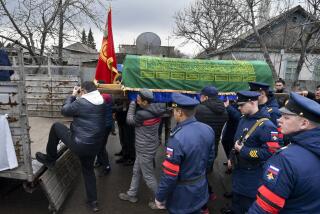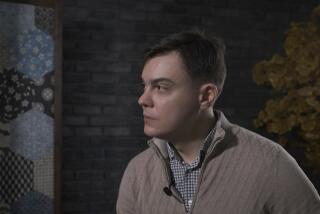Kirghiz Leader Envisions New, Capitalist State : Soviet Union: With the groundwork laid in his remote region, Akayev will visit the U.S. and U.N.
BISHKEK, Soviet Union — For more than an hour one morning last week, Askar Akayev was saying the most extraordinary things from the podium of an auditorium filled with budding entrepreneurs.
He spoke quickly and firmly, quoting from scientists and economists. He spoke of the morality of multiplying money, of the corruption and criminality of communism and of his personal commitment to build Kirghizia, an obscure region at the outer reaches of a crumbling empire, into Asia’s most progressive, capitalist state.
Meet the newly elected president of the recently proclaimed independent nation of Kirghizia, a remote republic bordering China’s western frontier that many experts, as well as Akayev, see as the world’s next El Dorado.
An estimated 80% of Kirghizia’s voters went to the polls Saturday to formally place Akayev, their leader for the past year, in the presidency. The large turnout underscored the popularity of the candidate, who was running unopposed.
Akayev is the first leader of a Soviet republic to win a mandate at the polls since the attempted coup d’etat by hard-line Communists failed in Moscow in August. So adept was he at harnessing the democratic and capitalist forces in his republic that he was endorsed by every major faction here.
At 47, Akayev is a rising star on the horizon of the Soviet republics. The dynamic physicist has spent the past year laying a foundation for what he hopes will be the first truly democratic, free-market state to emerge from the rubble of the Soviet Union.
Already, Akayev has taken concrete steps to reinforce Kirghizia’s declaration of independence as a modern capitalist state. He has secured a $100-million loan to expand Bishkek’s Manasa Airport into a world-class international facility. He has approved the first international flights between Tel Aviv, Bishkek and Beijing. And he is negotiating with senior leaders in Beijing to formalize official border and trade agreements with China, the ancestral homeland of many of Kirghizia’s citizens.
Trade delegations from Japan, Germany and even Brazil have visited his republic in recent weeks, offering Kirghizia desperately needed high technology in exchange for what ranks high among the world’s richest uranium, gold and mercury reserves.
Finally--armed now with a popular mandate bolstering him against vestiges of the Old Guard Communists in his republic--Akayev will arrive in New York on Saturday on what he sees as a critical mission for his nascent nation. He will appeal to the United Nations to officially recognize the sovereign state of Kirghizia, and he will meet with President Bush in an effort to lay the foundation for bilateral agreements with the United States.
But Akayev’s most important meetings will be next week in New York, where he will make his pitch to America’s corporate leaders and top business executives, who he believes have failed to notice the richest silver lining in the demise of the largest empire on the globe.
“Of course, I would like to attract the attention of America’s corporate society to gain from them economic and technical development for our republic,” Akayev told The Times in an interview soon after his session with the local businessmen last week. “And I make no secret about the fact that our republic is very poor and underdeveloped.
“But . . . we are not looking for handouts. Everything should be strictly on the basis of mutual benefit. Our republic is very rich in natural resources. You could even say we possess the most strategic of resources that include some of the richest gold and uranium mines in the world.
“If American businessmen come here and see for themselves, I guarantee you they will find here in Kirghizia a new El Dorado.”
Akayev, who has studied the American democratic system, sees the far-off United States as more than a market. For him, America is the ideal model for his new republic. In fact, the experts now drafting Kirghizia’s new constitution are using the American Constitution and Bill of Rights as a guide.
When asked if he expects quick recognition of his new nation from Washington, Akayev showed another facet of his personality--a hardened pragmatism that most analysts agree enabled him to swim against the tide of conservative communism for so long.
“Of course we hope that the U.S. will help us and benefit from us at the same time,” he said. “But I’m well aware that even powerful America cannot be everywhere in the world all at once. The Bush Administration is indicating that it wants to deal more with the Baltic republics and with Russia and the Ukraine.
“I’m a realistic politician. I can’t deceive anyone into thinking these relationships grow overnight. We hope only that your leaders will listen attentively to what we have to say.”
Akayev is the product of a lifetime of indoctrination in Communist ideology and of a centralized socialist economy. When asked to explain how he managed to overcome those forces, his aides and supporters cited several factors that they said set him apart from the authoritarian rulers who still govern the other four republics of Soviet Central Asia.
Unlike the presidents of neighboring Kazakhstan, Uzbekistan, Tadzhikistan and Turkmenistan, Akayev did not join the upper echelons of the Communist Party leadership until two years ago.
Moreover, he is not a politician by profession. He is a scientist, a professor and advanced researcher in optical physics. He spent the past decades not in party meetings or rubber-stamp parliamentary sessions, but in the libraries and classrooms of Bishkek’s Academy of Sciences, one of the largest groupings of scientists in any Soviet republic.
Also, Akayev is an ethnic Kirghiz, one of a fiercely independent community that stands apart from the scores of other nationalities that were conquered by the Russian empire, first by the czars and later by V. I. Lenin and his Red Army. Unlike their neighbors, the Kirghizes resisted the Islam of invading Muslim armies from the south for more than two centuries, until a moderate form of the religion finally took hold in the 1700s. And, despite seven decades in which only Russian and the Communist ideology were taught in their schools, the Kirghizes maintained not only their ancient language but also a rich, shamanist folklore that dates back to before the 8th Century.
“We are a very gentle but very determined people,” said Tonchubek Turgjunaaly, chairman of an umbrella organization that managed to unify the republic’s dozens of diverse pro-democracy groups in May of last year. “And a key to Akayev’s success is that he is very symbolic of that basic nature of the Kirghizes.”
Akayev’s elevation to the post of president came a year ago, when the republic’s Communist Parliament caved in to popular demands that it begin a gradual process of democratic reforms by removing the republic’s authoritarian leader.
That was at the top of a list of nine demands in a hunger strike led by Turgjunaaly and his Democratic Movement of Kirghizia that proved the turning point for the republic last October.
“Our demand was not specifically that Akayev be elected president,” Turgjunaaly explained. “It was simply that the president, whoever it is, must not be the head of any party. A week later, the Parliament elected Akayev, and we supported the decision. And, of course, we continue to support him now.”
Akayev has managed to install the republic’s most committed democrats in key Cabinet positions, like his highly progressive new interior minister, who is now cleaning house in Kirghizia’s national police. But the nation’s Parliament still consists of predominantly Old Guard Communists opposed to many of Akayev’s reforms.
To combat the conservative forces, which remain strong enough to blunt his capitalist crusade, Akayev leap-frogged Parliament, taking his appeal directly to the remote villages and urban neighborhoods of his republic during a weeklong barnstorming tour just before Saturday’s elections.
More to Read
Sign up for Essential California
The most important California stories and recommendations in your inbox every morning.
You may occasionally receive promotional content from the Los Angeles Times.










